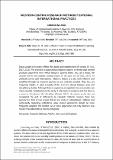Western centric research methods? Exposing international practices
Abstract
Data curated by humans reflects the biases and imperfections of humans (O’Neil, 2017; 2016). For example, in autonomous weapons systems, the initial data entered produces algorithms from which weapons systems learn, and, as a result, the systems mirror and amplify existing biases in the data sets (O’Neil, 2017). In political science and international relations, biases are also both inherent and amplified through the research approaches and methods adopted. They, too, are frequently hidden. A stark example of this is in the debate between area and disciplinary studies. Although there is a growing recognition that area studies can make valuable contributions to the study of international relations and that there is a need to ‘decolonise’ the discipline (Suzuki, 2021), the debate so far has not recognized the gulf of differences in research methods between these two approaches. This article argues that in the study of international relations and particularly regarding institutions, area studies approaches should be more frequently adopted. The limited use of these approaches not only hampers new research but also hides a colonial hangover.
Citation
Jones , C M 2021 , ' Western centric research methods? Exposing international practices ' , Journal of ASEAN Studies , vol. 9 , no. 1 , pp. 87-100 . https://doi.org/10.21512/jas.v9i1.7380
Publication
Journal of ASEAN Studies
Status
Peer reviewed
ISSN
2338-1353Type
Journal article
Collections
Items in the St Andrews Research Repository are protected by copyright, with all rights reserved, unless otherwise indicated.

